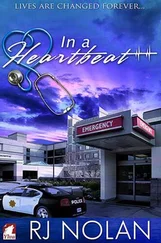Sometimes I hope she’s gone, that she’s in heaven looking down at all of this, but I’ve felt the weight of her hand in mine every day since she died. I’ve watched her fade, become smaller despite all the nutrients piped into her, the baby taking all it can.
She isn’t gone. Not like she should be.
My mother’s name was Lisa Davis Harold, and she was strong and beautiful. She was a person, she had her own thoughts, and I remember that. I remember how she was. Who she was.
I remember her.
I’m the only one who does.
6
At the hospital, Dan always goes in and says hi to Mom first.
Actually, he wanted “us” to go in and “say hello together,” but the first and only time he asked me that, the night after I’d lain in bed, thinking of my mother lying in the hospital kept alive for the baby—his baby—I said, “There isn’t an us. There’s you, and then there’s me.”
“But we’re family.”
“Were,” I said. “Go see what you’re here for. And then I’m going to see Mom.”
“I’m here every bit as much for your mother as I am for the baby.”
“I know. After all, if her body can’t be kept alive long enough, your baby won’t survive, will it?”
“Emma, that’s not—”
“It’s not? Then what is it?”
“It’s what your mother would want.”
I slapped him. Right there, in the hospital.
Security was called, but Dan said nothing was wrong, that we were “just struggling with our loss” and that he’d sit with me outside for a while.
He did walk outside with me, and he actually put a hand on my arm and said, “Emma, please. I don’t think you’re seeing—”
“Don’t touch me,” I said. “Don’t try to sell me your story. Mom loved you, I know that. You can kick me out of the house, send me to live with Mom’s parents, maybe boarding school. Take your pick.”
“I’d never do that. You’re my family. Don’t you know that? Don’t you know I love you like you were my own—”
“Go see her,” I said, cutting him off and making sure I was out of his reach.
“You should come too.”
“I don’t want to see her with you.”
“Emma—” he said and then sighed.
So that’s how I got to see Mom on my own. Dan goes in first while I sit in the waiting room outside the ICU, and then he goes and drinks some of the hospital’s sludge coffee. I don’t think he likes it, but then I don’t care what Dan thinks or likes anymore.
He’s in there now, doing his thing, and I’m staring at the ceiling. I did homework for the first few days, more out of numbness than anything else, and then I realized it was easier to just sit and look at the ceiling like I do at home. To think about how she’d painted it, to think about her, and not where I am.
To not think about Mom tethered to a bed by machines and IVs and the lump in her belly.
One of the volunteers comes in with the magazine cart. The thing is a joke because the hospital never has any new magazines. They just replace the old issues with slightly less old issues. But then I suppose most people in here aren’t really that concerned with what’s going on in the world.
I know I’m not.
The magazine cart squeaks as it comes over to the last table in the room, the one that’s at the far end of the bank of chairs where I like to sit. Not that there are a lot of people in the waiting room today. Or any day. The ICU is not a place where people come to stay for a long time. Not usually, anyway, but my mother is “special.”
The tears come again and I blink, watch the ceiling waterfall into little pieces as my throat gets tight.
I don’t want to see Mom like this, and I pinch the bridge of my nose hard. It makes my head hurt but stops the tears.
Mom used to do it whenever she thought she might cry. She hated to cry, and I can remember how, on the day she married Dan, she sat there getting her hair done and pinching her nose over and over so she wouldn’t cry and mess up her makeup.
I was part of the ceremony. Mom and I walked down the aisle together, and before Mom and Dan became husband and wife, Dan asked for my permission to be part of our family. He said, “I’m so happy to have found you and your mother and I promise I’ll always look out for you. I’ll always want what you do, I’ll always believe in you.”
“Liar,” I mutter, and wipe my eyes.
I look away from the ceiling and see Caleb Harrison staring at me.
7
It’s definitely him. We aren’t in any of the same classes but he’s in the lunch block Olivia and I share and I’ve seen him getting food, shoving his perfectly wavy blond hair off his face as he waits to pay.
“What did you just say?” he says, and if it wasn’t for the snarl in his voice—plus the fact that he steals cars (and now apparently drives them into lakes as well)—he’d be cute.
More than cute, even.
But he does sound angry, and under his hair, blond curls falling all over his face, his eyes are narrowed and very pissed-off looking.
“Nothing,” I mutter, and he grunts and turns away. I stare at his back and only then start to wonder why he’s here.
And why does what I said matter to him? Does he really think I would be sitting here, in the waiting room outside the ICU, and somehow be thinking about him? I mean, really? Yes, everyone knows who he is, but it’s not like he’s the kind of guy I’d go for. And besides, what do I have to be afraid of from him anyway? From anyone?
“Hey,” I say. “Can I have a Women’s One?”
He turns back around. “What?”
“A Women’s One magazine,” I say, and he really does think I was sitting here thinking about him, because he’s glaring at me and plucking a magazine off the cart like it’s diseased.
“What’s your problem?” he says, tossing it to me. It lands on the floor by my feet. “If you have something you want to say to me—”
“Emma,” Dan says, coming into the room, “you can go in now.”
“Great,” I say and get up, step on the magazine and then push past Caleb Harrison like he isn’t there.
8
Mom is...she’s the same as she’s been since she was put in this room. She’s still, so still, and I sit and look at her closed eyes, at her slightly downturned mouth. At the tube going into it.
Her skin is strange-colored, almost waxy-looking, and her hand is warm but limp in mine.
“It wasn’t much of a day,” I tell her, and look around. The unit Mom’s in has huge open windows by every door—I don’t know why—but I can see people in other rooms. Most of them are sitting like I am, hunched by a bedside. A few are weeping. A few are just staring, lost-looking.
I look away, look back at Mom. “I turned in my paper on the New Deal,” I say. “And we’ve started a new book in English that I like a lot. Oh, and I got an A on my Algebra II quiz.” I talk and talk, spinning a story of a day filled with academic success. Filled with lies.
Part of it is because I am looking at her and I want her to think everything is okay even though I know she can’t hear me.
Part of it is because part of me thinks that maybe she can, that despite everything the doctor said she will somehow open her eyes and say, “Emma, I know something’s wrong. I can hear it in your voice. Start talking, okay?”
Yes.
Yes, I want to talk about it so much; I love you and I miss you and I wish you were here but not like this, I don’t want you here like this and I know I’m seventeen but I don’t want you to be gone. I want you to open your eyes and tell me everything is going to be okay. I want you to squeeze my hand and tell me something, anything. I want to hear your voice, not the machines that beep all around us.
Читать дальше












